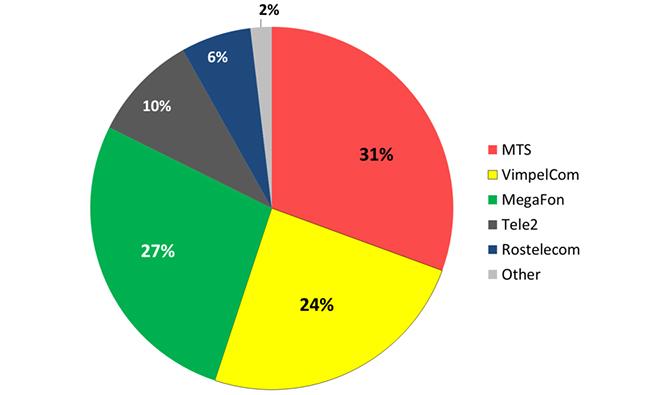Within the past week, three major Russian wireless providers have stopped carrying Apple's iPhone, with the largest telecom, MTS, dropping the handset due to the high subsidy costs associated with being an Apple partner carrier.

Russian telecom share. | Source: AC&M consulting via Fortune
While the Russian market is not yet a huge source of revenue for the smartphone market, Apple's loss of support from MTS, VimpelCom and Megafon will negatively impact its reach in the burgeoning market, reports Fortune
As Bloomberg reported last week, Russia's largest provider by subscribership, MTS, announced that it would be dropping the iPhone from its lineup, saying subsidies and marketing costs were to blame.
“Apple wants operators to pay them huge money, subsidizing iPhones and their promotion in Russia,†said MTS CEO Andrei Dubovskov. “Now it’s not beneficial for us. It’s good we stopped selling the iPhone as these sales would’ve brought us a negative margin.â€
Fortune'sPhilip Elmer-Dewitt speculates three factors played a part in the "big three's" decision to ditch Apple's handset. First, Russian carriers are limited by the federal agency Rospechat, which does not allow subsidies on the same level as seen in the U.S. For example, MTS is not able to offer an iPhone 5 for $199.
Duties and taxes are also higher than normal for Europe, with an unlocked 16GB iPhone 5 selling for roughly $925 on on the just-opened Russian Online Apple Store, or $276 more than an identical U.S. variant. Apple says $140 goes to Russian VAT, while the remaining $129 is for foreign exchange rates, import duties, and channel mark-up.
Finally, Apple's contract requirements, specifically those pertaining to marketing, are said to be extremely stringent. Because the contract terms are unknown, it is impossible to tell whether Russian carriers are subject to any special clauses.
The future of the iPhone in Russia is unclear, though estimates from IDC suggest that demand for the handset was already on the decline, dropping to 8.3 percent in the second quarter of 2013, down from 9 percent in 2012.
